Pixiedusters v. Doom & Gloomers: What’s Wrong With Disney Fans
The Disney fan community is highly fragmented, with many people fitting into two extreme camps: Pixiedusters and Doom & Gloomers. Pixiedusters are those who seem to love everything Disney is doing simply “because it’s Disney,” and question how anyone could criticize anything Disney has done. Doom & Gloomers seem to dislike anything Disney has done since 1996, contending that the parks are beyond repair, and that everyone that’s done now is somehow wanting. Given that I’ve encountered these two groups of people on a regular basis since joining the Disney fan community, and have only expressed my strong beliefs with regard to both groups in passing through trip reports, I thought it was worth delving into a bit more here.
The Pixiedusters believe, more or less, that everything Disney does is exceptional, and to in any way critique its actions or suggest that you’re displeased with Walt Disney Company decisions is tantamount to “Disney treason.” Doom & Gloomers, by contrast, are fixated on what the parks once were and is quick to criticize anything new on the basis that things aren’t as good as they used to be. Even new things that by most accounts are pretty impressive.
In fairness, these two groups are not the only types of Disney theme park fans. In fact, I think they’re a vocal minority, and most fans are (thankfully) actually somewhere in the middle. As suggested by my “thankfully” parenthetical, I don’t align myself with either group nor am I really a fan of either. With regard to the former group, I think it’s ludicrous to think that a company is infallible, and with regard to the latter group, I think it’s equally ridiculous to live entirely in the past and condemn anything that’s new. I’ve been accused, at various times, of being in both groups, but I would like to think that, like most fans, I fall somewhere in the middle.
Addressing the latter group first, my comment above is not to say I think things are perfect. Moreover, I realize that as fans, we feel an emotional attachment to many attractions for personal reasons and we often pine for nostalgia. However, embracing our nostalgia while understanding the need for progress is not the same as demanding nostalgia for its own sake. Critique of Disney’s decisions should be firmly grounded in logic, and should not be predicated upon our childhood love for the cardboard cut-outs that lined the insides of our favorite dark rides. There is nothing wrong with critique; I have expressed my fair share of displeasure at certain decisions Disney has made, and I certainly will continue to do so in the future.
That said, I think some folks in the fan community take their beliefs entirely too far. I absolutely love reading about the history of Disneyland and Walt Disney World, but some who write about extinct attractions and Disney ephemera do so with a thinly veiled disdain for the contemporary parks.
When I read remarks and articles (by those who still visit and claim to like the parks to this day) that Disneyland and Walt Disney World are shadows of their former selves that have been bastardized by corporate synergy and corner-cutting, I can’t help but scratch my head. The common sentiment towards these “fans” is that they simply shouldn’t visit the parks if they are so critical. Normally, my response to this sentiment is that you can be critical of something and yet still be a fan.
Whenever I read this “if you don’t like it, don’t go” sentiment, I am actually reminded of a quote by Thomas Jefferson: “Question with boldness even the existence of God; because, if there be one, he must more approve of the homage of reason than that of blindfolded fear.” I think this quote is apt here as it eloquently expresses the wisdom that unquestioning allegiance to anything, even that which man holds most sacred, is not a pragmatic idea. However, when these “fans” go as far to say that, at present, Disney is doing little if anything correctly or to the standards it once held, I can’t help but wonder why they still describe themselves as fans. Life is too short to be fixated on something that, by and large, you don’t like.
Many of these same fans will also quickly react to Disney’s decisions as if running the Company is akin to a quick game of Rollercoaster Tycoon. This type of “X is bad, Y is good” sentiment also reduces decisions that Disney has made to their simplest terms. By way of example, many in the online community condemned the NextGen project as soon as a couple talking points were released, but years before the bulk of the project would come to fruition. These fans argued that the purported amount to be spent, over a billion dollars, on this project would be better spent on a few attractions. That some fans would rather see money spent on attractions than the NextGen project doesn’t make it fact that one is a better use of money versus the other.
More importantly, this sentiment ignores other variables, such as the continued operational costs and maintenance of one versus the other, the resulting staffing efficiencies in one versus the other, and the return on investment, among other things, of one versus the other. For instance, what if the NextGen project costs $1.5 billion and has a yearly maintenance and operational cost of $10,000,000, but reduces yearly staffing costs by $50,000,000, and generates $60,000,000? And what if the few attractions that would require a similar $1.5 billion capital expenditure have a yearly maintenance and operational cost of $15,000,000, require spending another $5,000,000 on staffing, and generate $10,000,000 in additional annual revenue? With this additional information, it’s now clear that the “alternative” doesn’t have the same cost or return as what Disney chose.
All of these numbers are necessarily hypothetical, which is the case because in a complex business organization, decisions involve a myriad of factors, most of which are beyond the grasp or knowledge of most individuals outside of the business making the decisions. That’s sort of the point I’m making here. In fact, the hypothetical variables I’ve presented here probably overlook a large number of variables beyond my grasp.
It’s easy to criticize something on its most basic terms, but those in decision-making positions can’t reduce things to their most basic terms. Since fans aren’t privy to all of the variables that come into play when these decisions are made, it’s incredibly difficult to (accurately) say that the money would have been better spent in a different manner.
This example also illustrates another problem with the “criticize first, contemplate later” mentality: it’s too quick to condemn a project before it has come to fruition. Such has been the case with NextGen, as it draws the ire and scorn of many in the online community, despite the bulk of its details being unknown by the public beyond a couple statements involving planning attraction visits from home by Tom Staggs and the few interactive queues that have already been constructed. Some critics wisely crouch their objections behind conditional statements that “if” the project involves certain things, they will be disappointed. Others blindly criticize that spontaneity in vacations will be “ruined” as soon as XPass and other components are rolled out. At this preliminary stage, it’s simply too early to speak in such absolutes. Given that FASTPASS hasn’t ruined spontaneity, I’m inclined to err on the side of thinking that nothing will be ruined by XPass, but like I wrote above, I don’t know one way or the other.
Unfortunately, speaking in absolutes and hyperbole seems to be en vogue in fan communities where rationality, logical reasoning, and deliberation are weak currencies. Another illustrative example of this is the Magic, Memories, and You! show that debuted in 2011. Prior to its debut, it was widely criticized. Now, most people are either silent on it or express how much they enjoy it. Very few still publicly criticize it, and it wouldn’t be surprising if many of these folks do it merely for the sake of consistency. By and large, the show has been a resounding success, and is beautifully done. Heck, the new Christmas version even has a nod to the Castle Cake for us fans of that!
Further, I think a lot of the changes that have occurred in the Disney theme parks have been occasioned by changes in society. If you don’t like the new script for Spaceship Earth, don’t think the Phoenicians, thank the countless guests who were likely bored by the previous experience. While it’s dangerous and disappointing when companies cater to the lowest common denominator, companies do have to consider their customer demographics. Many contemporary Disney guests simply don’t appreciate or grasp the “edutaintional” components that made so many fans fall in love with EPCOT Center. Many aspects of this edutaintional EPCOT Center still remain at Epcot, but in an era when reality TV, crude cash-in movie sequels, and celebrity gossip are overwhelmingly popular and literature, independent film-making, and witty television have trouble finding audiences, it should come as no surprise that Disney aims for many of its attractions to appeal to broader audiences.
As I said above, though, all of this does not mean that Disney is infallible and should never be questioned. Even the premise of the paragraph directly above is worth questioning. As has been the case with many Pixar films, can’t the Disney theme parks hit that broad audience while also creating something that can be enjoyed by a more discerning audience?
The fact that many business decisions made by Disney are outside the frame of knowledge held by most fans does not mean that decisions made by Disney are above criticism. While it’s difficult to criticize the business component of the decision, it is not so difficult to criticize the artistic aspect of moves. Many individuals won’t criticize anything Disney does because they feel that makes them less of a fan, or because they “trust in Disney.” If someone thinks that you’re less of a fan because you think critically about something, you shouldn’t care about their opinion. Trusting in Disney isn’t such a bad idea prior to personally experiencing a finished product, but taking that a step further and not criticizing something that seems amiss to you just because the company that created it “must” know what it’s doing given its track record is ridiculous. In diverse companies such as Disney, mistakes are made, and the wrong people often have too much input thanks to the bureaucratic process.
For me, a prime example of the importance of speaking up in a rational and well-thought manner is Journey into Imagination. From an artistic perspective, I have very few positive things to say about the present incarnation of the attraction as compared to the first incarnation of the attraction. However, as compared to the middle incarnation, I think the third version is an improvement. It seems that the third incarnation was occasioned by fan and guest feedback, and their disappointment that Figment was removed from the attraction. While I’m not exactly a fan of Figment’s personality in the present attraction, it’s at least better than nothing. To me, this demonstrates the importance of the fan community and guest feedback, and demonstrates just how well-thought feedback can impact Disney’s decisions.
In other instances, Disney has let maintenance slide, presumably, because most guests won’t notice. In yet other cases, Disney has cut corners, offering less and charging more because there is sufficient guest demand to justify the move. These moves do skew more towards the above-category of business decisions, but in this case, I don’t think these decisions are above criticism, as it seems fairly clear that these decisions have been made for the sole reason of increasing short term profits and not thanks to a number of complex variables of which most fans aren’t privy. In circumstances such as these, guests and fans play a great role in keeping Disney accountable by pointing out to others that these cuts have occurred or pointing out to Disney that the cuts have been noticed and will impact the spending habits of those guests. Much like in the branches of government, fan and guest feedback provides a “check” on Disney’s business decisions.
Other things that Disney has done, such as changing the TTA narration, have irritated me individually, but I realize in the grand scheme of things, are relatively insignificant to most guests. For me, it’s a case of picking battles that logically make the most sense, and complaining about the narration of an attraction just isn’t a wise battle to pick.
While I may have personally loved that narration, others might have felt it overstayed its welcome, and was due to be changed. One person’s beloved nostalgia that should never be changed might be another person’s dated junk that is 10 years overdue to be replaced. This is why I believe it’s important to attempt to look at decisions Disney makes as objectively as possible.
Obviously there’s an inherent subjectivity to this, but my point is that when taking to the internet and spewing venom or praise over the latest Disney announcement, perhaps fans would be well-advised to consider the decision beyond the end of their own nose.
to this end, Disney is in a difficult position as it tries to navigate the diametrically-opposed waters of nostalgia and progress. As it navigates these waters, it finds a divided fan community that, on one side, loves all things once they’re gone, and on the other side, praises everything new.
I believe both groups are rendering their voices meaningless to some extent, and it’s difficult for Disney to find the meaningful and constructive feedback in the sea of irrational noise. The “past-loving” group is doing so because nothing Disney can do will please it. Disney could change bathroom tiles, and someone in the former group will complain about it because they loved the old tiles.
Conversely, Disney could engage in a plan to systematically kill all baby walruses, and some in the “Disney is infallible” group would claim the walruses had it coming.
I think all Disney fans would be well advised to give a little more thought to the Company that they both purport to like, and offer feedback on that more thoughtful basis. Giving something new the benefit of the doubt, contemplating how it will affect most guests, or considering the potential rationale behind it of which the public may be unaware, doesn’t make one less of a fan of the history of the parks.
Likewise, expressing well-reasoned and thoughtful criticism of something new doesn’t make one less of a fan towards the contemporary offerings or Disney in general. It’s highly unlikely that the fan community will ever have a cohesive voice thanks to our diverse opinions and preferences, but having a consistently rational voice seems as if it would be highly beneficial.
So, when answering the question of “which parks will you celebrate?” the answer should not be “the past,” or “the present.” Great things happened in the past, and great things are happening in the present. It thus seems plainly clear that the answer should be “both.” Keep that in mind when reacting to Disney online.
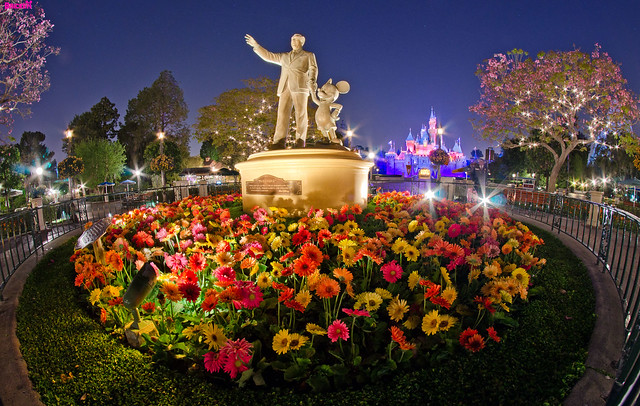
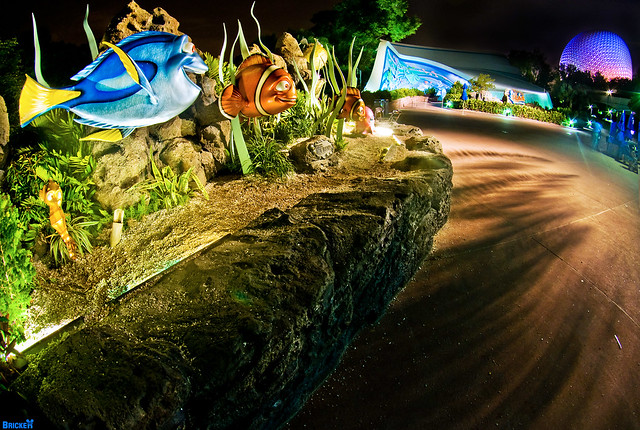
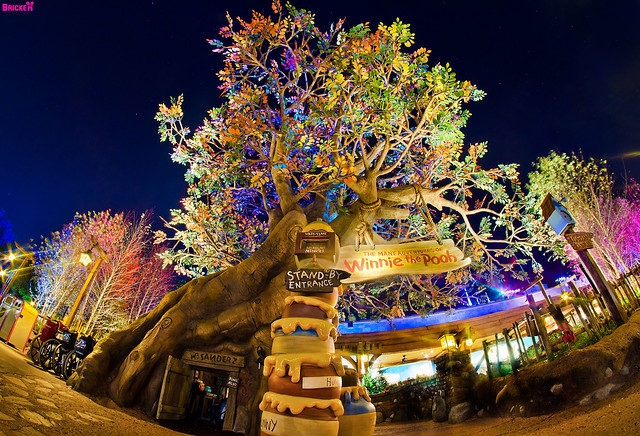
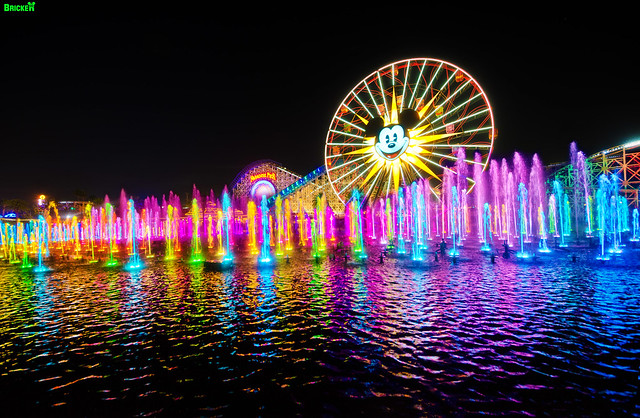
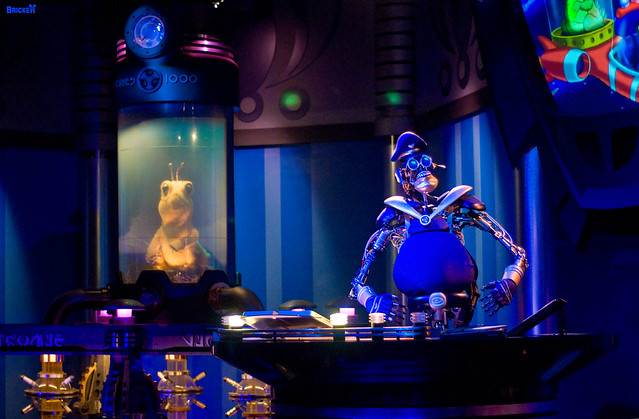
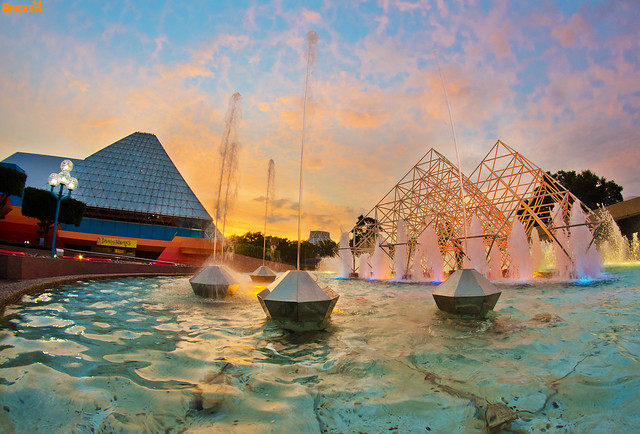

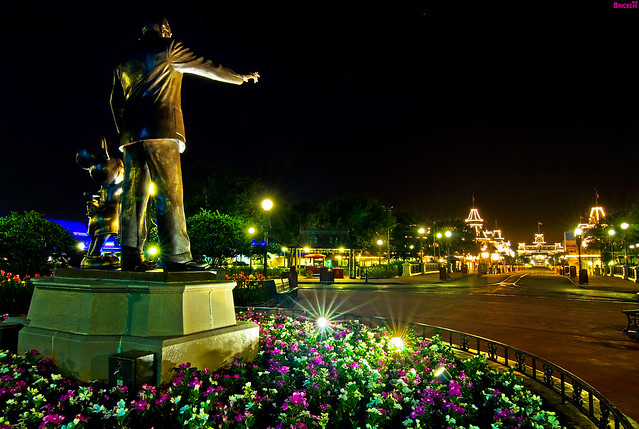
You suggest we give feedback to Disney. Where or how do you recommend we do so?
I’m not aware of group within Disney that receives feedback at a level higher then guest services.
Super website!
Nice website!
Well said! I have similar feelings concerning Journey Into Imagination and other such rides; however, without change, the parks would become stale and no one would want to visit. Even those stuck on nostalgia. I really enjoyed this article and I’m very happy that Disney has not decided to kill all the baby walruses.
Tom, this post ws one of your best! Very well written. Thanks for the great read!
I just wanted to comment that I’m impressed you were able to bring walruses into this.
Great work and very well put.
Well said! I am a big fan of both your pictures and blogs. I too find it very difficult to tolerate the “far left and far right” of Disney fans. My wife was a performer at Disney for years and heard a lot of the inside scoop. Disney always has a reason for making the decisions it does, whether it’s the right choice or the wrong choice in the long run. Keep up the good work!
– A fellow Hoosier
If you are a present Member or Graduate of WED Enterprise or WDI Imagineering, you are probably in the middle when deciding what is an E Ticket or A Ticket attraction. F Tickets do happen like all of Tokyo Disney Seas as a whole.
Good article. I agree that the “middle ground” is probably the best position to take because blind criticism or praise will result in no action from Disney. If one praises everything, Disney will think they’re doing everything well, and if one criticizes everything Disney will write the person off as a malcontent and ignore him or her.
As far as the sentiment that Disney should not change with the times by building more complex and/or thrilling attractions, the rationale is often that “Walt would not have wanted this.” This is most often used to refer to the “disasters” that are Mission: Space and now Avatar. Personally, I do think Mission:Space was a poor investment but I do not hear similar criticism regarding Tower of Terror, Everest, or even the Matterhorn (which Walt Disney himself oversaw and yet has a height requirement). In a way, Disney is in a no-win situation. To this end, if Disney did build only what “Walt [supposedly] wanted,” there would be nothing but Dumbo type rides and people would be complaining that the rides are too tame and boring.
But seriously, the bathrooms between Frontierland and Adventureland? Totally awesome tiles.
Score one for common sense!
Great read, Tom.
I couldn’t help but be reminded of similar polarity that exists at my job. We have two vocal groups, pro-union and pro-company. One group praises and endorses company decision no matter what, the other resist such decision out of the belief that all decisions are made out of greed or some malicious intent. What people need to remember is it’s all a business. Decisions are made out of the interest of making money. If a business does not make money, it cannot continue to provide a product or service. That gets lost with a lot of people as they develop a sense of entitlement.
Like most, I fall somewhere in the middle. I’m all for nostalgia but Disney is doing enough right that I continue shell out the money and enjoy the parks.
I agree with your statement and I too reside somewhere in the middle. I miss Horizons very much, but I also enjoy Mission Space. Think of all the wonderful new attractions we would miss out on if nothing ever changed. Sure, there will be some duds, but I think the great rides will far exceed that. As for the TTA, while I too miss the old narration, at least by Disney paying attention and upkeeping the attraction. To me that means at least that they know its there and that people enjoy it and will hopefully keep it around. But if there did replace it, I would be very sad, I will also hope that whatever they choose to replace it with will be far better than anything I can imagine. That is what keeps me going back to Disney.
Well spoken. There are certainly those who I have stopped listening to, following on Twitter, or reading their blogs because I know that it’s all naysaying and kvetching. One thing I’ve learned at my job is that decisions a company makes are never going to please everybody. You hit the nail straight on the head by saying that Disney is making decisions to please as many people as possible. And while that might not please the hardcore fans, in the end, those fans are actually a minority. It’s a better business decision to cater to the majority.
However, as you mentioned, Pixar has a really unique way of catering to both the hardcore fans of Pixar and the casual movie-goer at once. Rather like the Muppets had jokes for kids, but also some really funny jokes just for adults, in their old Muppet Show episodes. So that is doable, it is possible to please everybody. And I honestly think Disney is trying to do that. But it is harder, and you are going to have failures along with the successes. The thing about retrospect is that people remember only the successes. Were the 1950s really so much better than today? They were not, but people, looking back, only remember the good things. There were original Disney rides that were absolute bombs, I’m sure of it! But nobody remembers any of them. I am curious to see, in 15 or 20 years, what people are saying about “our” Disney. Will they even remember the change in voice in the TTA? Or will they be amazed at how realistic MISSION: Space was? Will the remember the cuckolded Backlot Tour? Or raving about how much fun they had on Toy Story Midway Mania?
An excellent and thought-provoking post! Like you, I tend to be somewhere between the extremes that you describe.
I think one of the most important points in this post is that the Disney parks and their attractions have to change with society and the times. As much as I loved the slow Epcot Omnimover rides, they just won’t draw audiences today the way they did in 1982.
Thanks!
Well said. I always try to remind myself to have a good balance of remembering the fun things of the old days while enjoying the fun things of the present days. There is still more than enough good stuff to keep me going back.
Fajna stronka:)